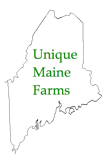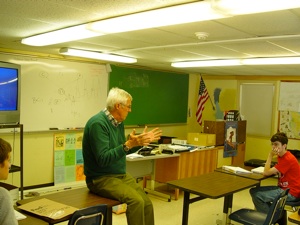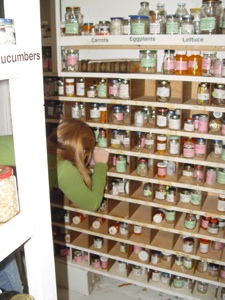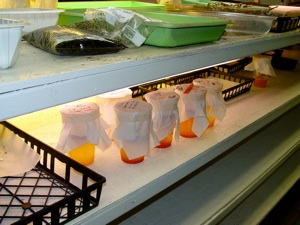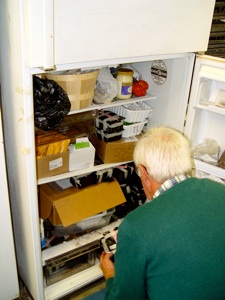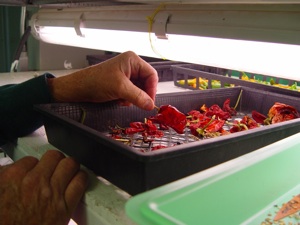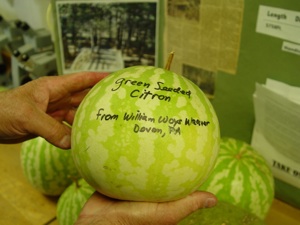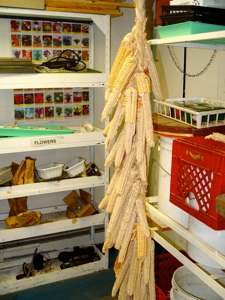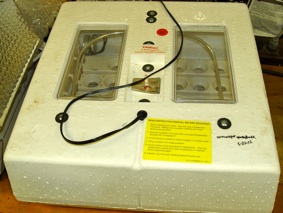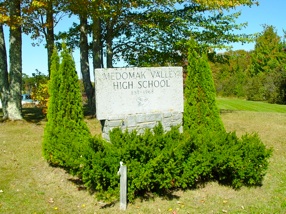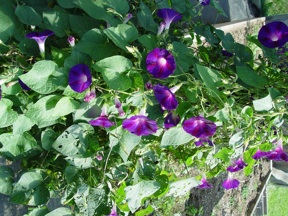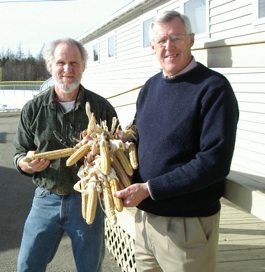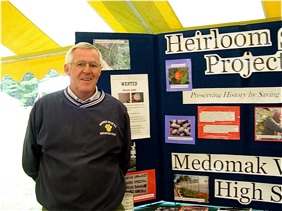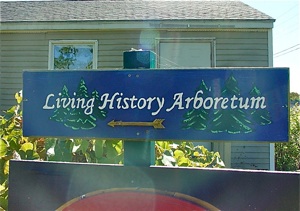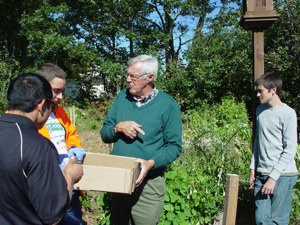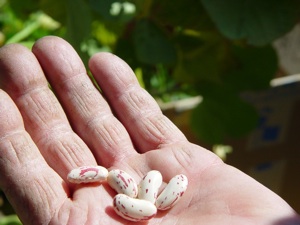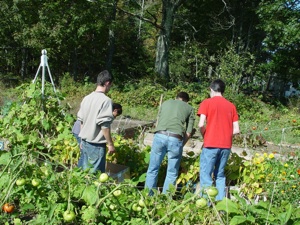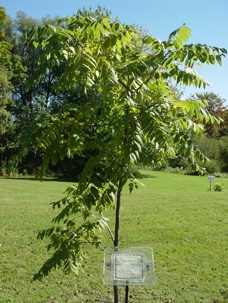Name: Medomak Valley High School
Seed Preservation Project
Contact: Neil Lash
Location: 320 Manktown Road
Waldoboro, Maine 04572
Phone: 207-832-5389
Email: neil_lash@sad40.k12.me.us
Seed Catalog Website:
http://msad40.org/seedsavers/NoteShare/Notebooks/MVHS_Heirloom_Seed_Catalog/?5
Products:
-
-collections of heirloom seeds
-
-Living History Arboretum
-
-horticultural classes
What Makes the Medomak Valley High
Heirloom Seed Project So Unique?
It is quite amazing to learn that Medomak Valley
High School in Waldoboro, Maine, has the distinction of being the oldest high school seed saving program in the United States. It was co-founded by Medomak Valley High School teachers Neil Lash and Jon Thurston in 1991. Both teachers are still deeply committed to seed saving. They were asked to speak in the summer of 2012, at the Seed Savers Exchange in Decorah, Iowa.
While Jon Thurston now serves as the Agricultural Coordinator for the Troy Howard Middle School in Belfast, Neil Lash has remained at Medomak Valley High School as an instructor of Horticulture I and Horticulture II classes.
A horticulture program was begun at Medomak Valley High School in 1972. Ray Flagg was the original instructor. There was one 25x100 greenhouse at that time and a headhouse/classroom combination. As the program expanded, a second heated 30x60 greenhouse was constructed and two portable classrooms were added.
In the Horticulture I class (Botany) at Medomak Valley High School, there is a focus on plants and the operations of a greenhouse. There is also an introduction to all aspects of propagating, growing, and using plants and plant materials. In Horticulture II (Advanced Botany) there is a continued focus on greenhouse management and students study cold frame designs and uses. The students plan and plant experimental vegetable gardens; construct raised beds; and study basic landscape concepts. They raise and collect heirloom seeds as part of a national network of seed-savers.
The American Chestnut Foundation donated a small 15x30 greenhouse to Medomak Valley High School because of the collaborative work that was taking place. Roll-up sides and raised beds were added to the donated greenhouse. Mr. Lash and the Medomak Valley High School students worked with the Maine Chapter of the American Chestnut Foundation several years ago. The students planted two thousand chestnut seeds from wild Maine trees. The seedlings grew in the donated hoop house on site at the high school.
The chestnuts had been in cold storage all winter in a process called stratification without which the seeds would not have germinated. At planting time, many had roots, or radicals, emerging from the nut shells, indicating viability and readiness to grow. Nuts were carefully inserted into the growing media. After watering, they were lined up in the greenhouse that provided a 55 %-shade environment for the growing shoots that followed root development. In 2001, Mr. Lash's classes planted hybrid chestnut seed that the Maine Chapter of the American Chestnut Foundation planted into their new breeding orchards.
The Medomak Valley High School horticultural program continued to grow with each passing year. A 12x20 greenhouse was also purchased and was built on skids so that it could be moved. Hardy greens are being grown in this greenhouse. They are being purchased by faculty and are being used in the school cafeteria. The students have been experimenting with Eliot Coleman’s winter gardening techniques that successfully extend the growing season in Maine.
The Medomak Valley High School Seed Savings project incorporates the involvement of many members of the community. There are plant sales in the spring, pizza get-togethers, open houses, and fundraisers. Mr. Lash has led workshops and talks on seed saving programs. He has shared seed saving techniques in the garden catalogs. Since there must be quite large garden spaces to prevent cross-pollination when saving seeds, the Medomak Valley High School seed saving program relies on some of the students and local gardeners to help grow the seeds in their gardens. The late Ann Johnson was very supportive in supplying flax seeds and demonstrating how flax was used in making linen.
Medomak Valley High School has published their
nineteenth edition of their seed savings catalog.
It can be found online at: http://msad40.org/seedsavers/NoteShare/Notebooks/MVHS_Heirloom_Seed_Catalog/?5
Visitors to the online catalog will soon learn that the selection of the heirloom seeds that Mr. Lash and his horticultural students have collected is truly quite
phenomenal. There are around ninety varieties of
rare bean seeds of all different sizes, shapes, and colors that they offer including beans from South America, Vermont, California, England, France,
and Sweden. Beans from the Passamaquoddy Indians, the Tuscarora Indian Reservation in California, and several other Native American tribes, are available for sale. There is an Highland bean brought back from a soldier from the Mexican War in 1846, and a bean brought from France by Marquis De Lafayette around 1776.
The Cherokee elder, Carl L. Barnes of Turpin, Oklahoma, was the source of the Cherokee Trail of Tears corn that was a combination of two ancient Cherokee sister seeds (white flour and blue flint). The seeds for the Mesquakie Indian corn were from Michigan. The Rhode Island Eight Row Flint corn
originated from the Narragansett Indians and the Rhode Island White Cap Flint corn came from the Howland family, descendants of the Mayflower Pilgrims. Other available corns include Tuscarora Iroquois Flour Corn; Hopi Blue Corn; Painted Mountain; Cherokee Indian Flour Corn; and Mandan Bride Corn.
Four varieties of cucumbers; ten varieties of garlic;
two varieties of ground cherry; four varieties of Jerusalem Artichokes; seven varieties of lettuce; four varieties of wheat; nine kinds of cantaloupe; eight types of watermelon; ten types of potatoes; four types of garden peas; five kinds of pod peas; three types of soup peas; and two varieties of cowpeas are all offered by the Medomak Valley High School students.
As far as carrots, students have kept busy growing the ancient Afghan variety which has large irregular shapes in various shades of purple. All types of peppers (hot, non-bell sweet, and bell sweet) and squash (maxima, mixta, and pepo) and tomatoes (red, orange to yellow, pink to purple, and other colors) are offered. Bernard Newbert rhubarb and two varieties of rutabaga can also be purchased.
Medomak Valley High School offers twenty-seven varieties of bush/snap beans; forty-four varieties of pole beans; thirty-three varieties of pole/snap beans; three varieties of lima beans; and the Windsor Jubilee Fava Bean similar to the variety grown by Thomas Jefferson.
Those who know of Neil Lash’s expertise in history are not surprised to learn that his students are growing seeds from the time of Thomas Jefferson. Mr. Lash is a history buff who is extremely knowledgeable of all periods of Maine and American history. He and his students have contacted various Native American tribes, historical societies, gardening organizations, and museums to request rare heirloom seeds.
There is a Living History Arboretum at Medomak Valley High School. There are various trees of significant historical background such as an apple tree that was donated by Laura Freeman, the great great great great great great niece of Johnny Appleseed. There is a Charles Huebner (Havener) maple tree; an Alfred Storer maple tree; a Mule Shoe Salient Oak; a Harpers Ferry Kentucky Coffeetree; a Battle of Antitam Honeylocust; and a General James Longstreet Oak. By sharing the historical information that is associated with the various trees, students in Mr. Lash’s horticulture classes have had the unique opportunity to learn a great deal about local Waldoboro history, and the history of Maine and the United States in its earliest days.
The Medomak Valley High School was able to grow plants in 1999, from several seeds from the Thomas Jefferson Center for Historic Plants. It is an educational program that is dedicated to the preservation of historic plant varieties. The Medomak Valley students sold French Mallow seeds and Globe Amaranth flower seeds in 2012, that were harvested from plants grown in Thomas Jefferson’s garden at Monticello.
The students were also able to acquire seeds from George Washington’s Mt. Vernon estate and gardens. In 2012, they sold eighteen varieties of flower seeds that were from the gardens of George Washington. Flowers from various other sources were also available for purchase. They included such varieties as heirloom columbine, old-fashioned poppies, flax, tobaccos, hollyhocks, ihi, mallow, petunias, Mexican sunflowers, morning glories, tarahumara, dahlias, and sunflowers.
The Medomak Valley High School has also
experimented with raising heritage breeds. They acquired an incubator and attempted to raise Dominique chickens and Royal Palm turkeys.
Neil Lash and his students have been a powerful
force in the seed saving efforts in the state of Maine.
His knowledge, dedication, and tireless efforts to
preserve biodiversity are truly a great source of pride to Medomak Valley High School and the state of Maine. He has enabled his students and members of the community to gain an appreciation for flowers, vegetables, and trees that figured predominantly in the history of the local community, the state, the country, and various locations throughout the world. He and his students should be commended for their work which leaves a significant horticultural legacy for future generations.


